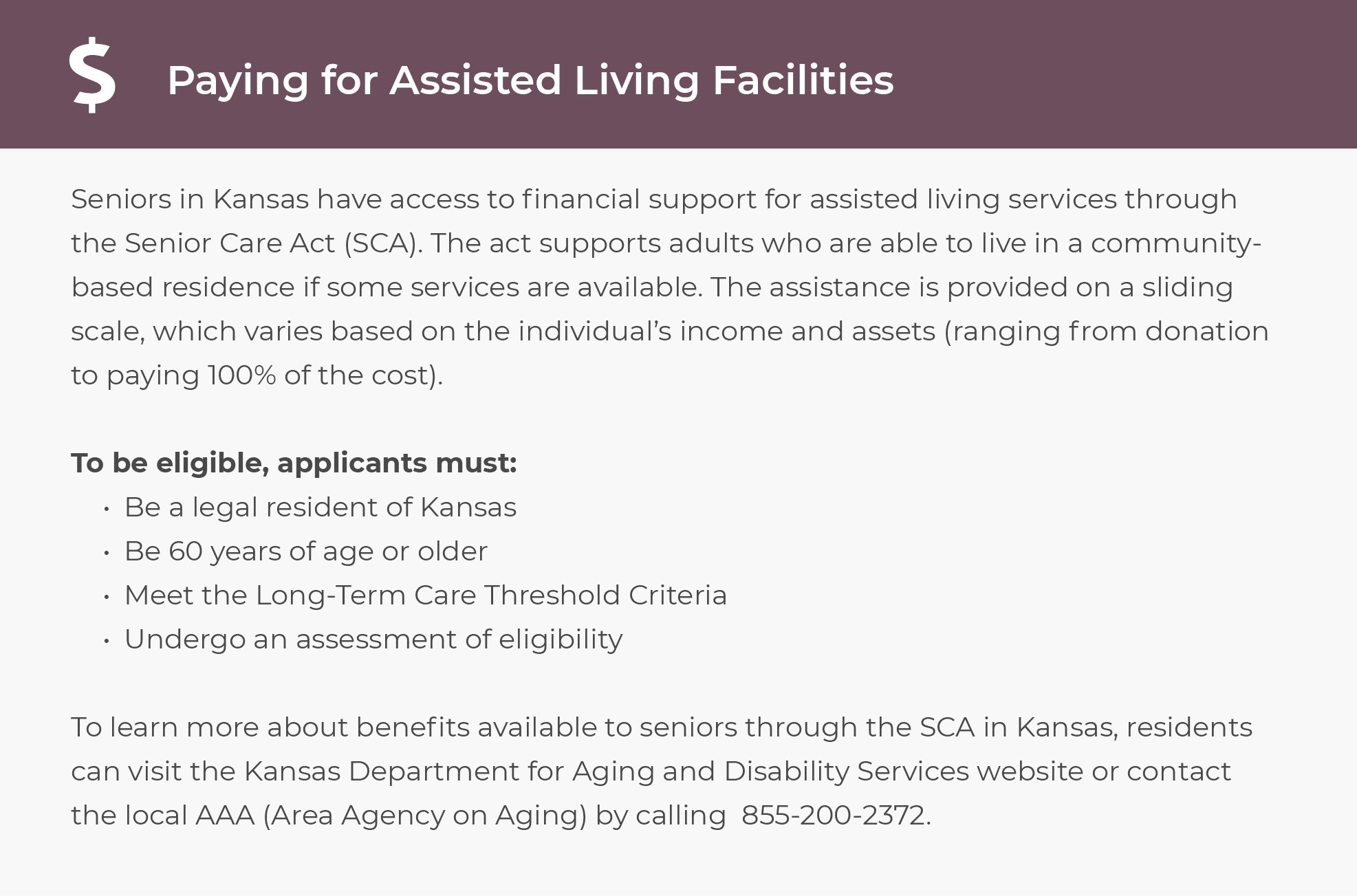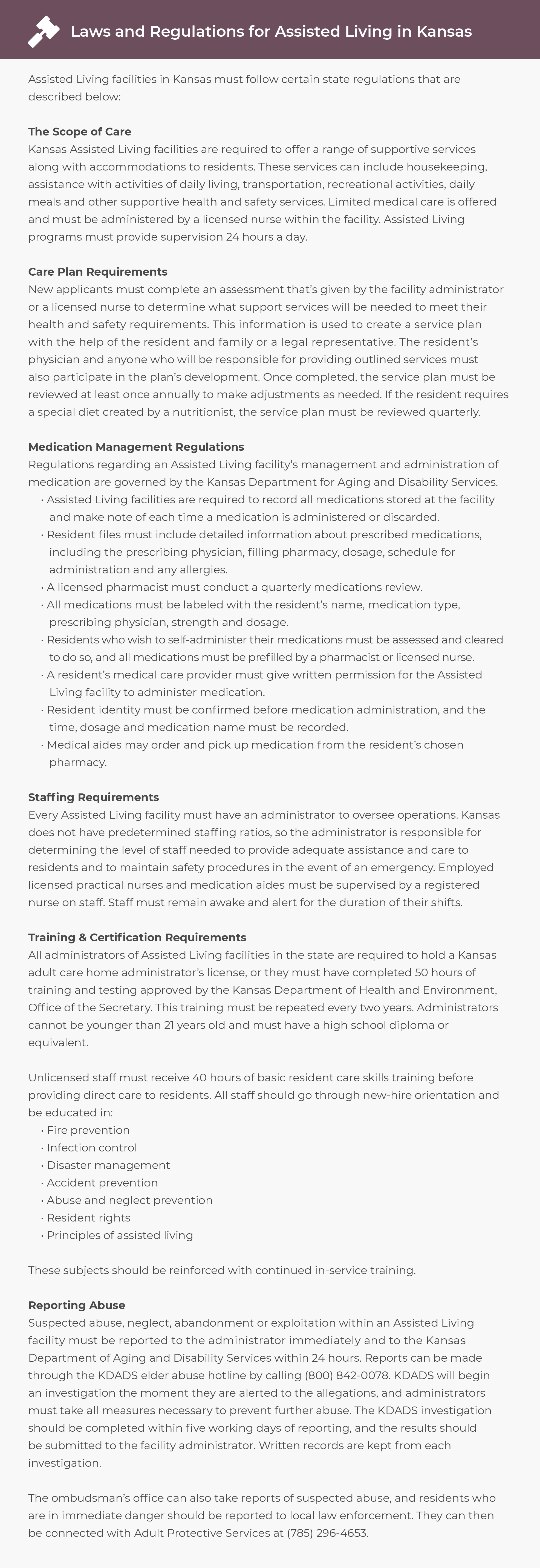Kansas City, Kansas, is the Kansas half of the greater Kansas City area, sharing a border and metro services with twin city Kansas City, Missouri. KCK, as it’s known locally, is the location of the Kansas Speedway, the host of the NASCAR Sprint Cup races. The Kansas City Chiefs football team and the Kansas City Royals pro baseball team also call this city home. KCK is a midwestern city, with hot summers and cold winters with snow, although the fall and spring seasons are quite pleasant. The cost of living in Kansas City is nearly 20 points lower than the national average, which can be beneficial for seniors who are budgeting for assisted living accommodations. In addition, Kansas exempts Social Security Income from state income tax (for amounts less than $75,000 per year), as well as government pensions, which many seniors may find advantageous.
As an intermediate long-term care option, assisted living provides seniors who don’t need full-time care with a full-time community residence. Here, they can access activities of daily living assistance, prepared meals and even facilitated social activities. For Kansas City seniors, a month’s stay averages $4,585. This is on par with the national and state averages.
Below, we compare costs to more nearby areas and outline some resources for obtaining financial assistance for assisted living in Kansas City. Additionally, we discuss local laws that protect seniors who pay for and receive long-term care.
Hundreds of thousands of American seniors utilize assisted living, a figure that is only growing. For these seniors, assisted living combines residential housing,assistance in daily activities, and some healthcare. These communities also strive to provide an atmosphere that is comfortable and engaging for their residents… Read More >
COVID-19 restrictions and rules for Assisted Living Facilities are typically set by the state – to see the rules in your state, you can read our guide to Assisted Living in Kansas. Keep in mind that there may be other policies that communities put in place to protect their residents, so you should contact your local community for more information. Additionally, you can contact your local Area Agency on Aging to learn more – find contact information here.
An average monthly cost of $4,585 is estimated for Kansas City’s elderly, according to Genworth’s Cost of Care Survey 2021.
Kansas City’s average cost of assisted living, at $4,585 per month, is just $5 more per month than Kansas’ average rate. It’s also only $85 more per month than the national average.
Within Kansas, the most expensive city for assisted living is Wichita, where the monthly median price is $5,425. This, like costs in Manhattan ($5,398), is nearly $1,000 more per month than the most affordable city for assisted living, Topeka, with its monthly rate of $4,495. Lawrence and Kansas City are nearly equivalent in costs ($4,538 and $4,585). However, in neighboring Missouri’s city of Joplin, the average rate is $1,780 less than Kansas City, at $2,805 per month.
Note: Data for Kansas City, KS, was unavailable, so data for the nearest city, Kansas City, MO, was used instead.

Since not everyone can afford to pay for assisted living out-of-pocket, it’s important to find alternative methods to help make assisted living more affordable. Some of these options include:
For more information about your options for making assisted living more affordable, visit our guide to Assisted Living in Kansas.
| Contact | Description | |
| Kansas’s Long-Term Care Ombudsman Program | (877) 662 – 8362 | Residents of long term care facilities and their families are represented by the ombudsman services program. Caseworkers investigate complaints about residential care homes, including assisted living communities. Complaints may be made anonymously. Ombudsmen also advocate for the interests of the elderly at the state and local levels for changes in laws and regulations. |
| Kansas Legal Services For Seniors | (785) 233-2068 | Kansas elderly who meet certain income guidelines are eligible for free legal services including general advice and help with drafting wills and living wills. Other services include help filing complaints of elder abuse, divorce, bankruptcy and some other civil matters. |
| Kansas City Vet Center | (816) 753-1866 | Vet centers help military veterans and their surviving dependents access benefits from the Department of Veterans Affairs, including counseling services, financial advice, death benefits and health care. |
| Wyandotte/Leavenworth Area Agency on Aging | (913) 573-8531 | The AAA represents the interests of seniors in Wyandotte and Leavenworth counties in Kansas. Programs include education about nutrition and health screenings, help applying for government benefits and health care and administering the Aging and Disability Resource Center (ADRC) which provides counseling services for seniors and their caregivers. |
| Unified Government Transit (UGT) | The UGT public transportation system in Kansas City is a fixed bus route service that has routes through KCK and connects to the public transit service in the greater Kansas City metro area, the KCATA. Seniors may be eligible for reduced rates for both transportation systems. Paratransit is also available. | |
| Don Bosco Senior Center | (816) 691-2900 | This senior citizens’ center offers comprehensive programs for seniors. Lunches are provided during the week as well as information about nutrition and health care. Different senior-friendly fitness classes are planned throughout the week, as well as other social activities such as card and board games and hobby groups. Holiday celebrations and dances are scheduled throughout the year. |
| Kansas Equipment Exchange | (866) 666-1470 | Kansas residents who meet certain guidelines for income levels and have a demonstrated need may be eligible for loans of durable medical equipment, including wheelchairs, walkers, TTY equipment and bathroom equipment. |
Assisted Living Facilities in the Kansas City area are required to follow a set of rules and regulations that are determined at the state level. For an overview of those rules and regulations, see the information below. For more specific information, talk with your local community or Area Agency on Aging.






















